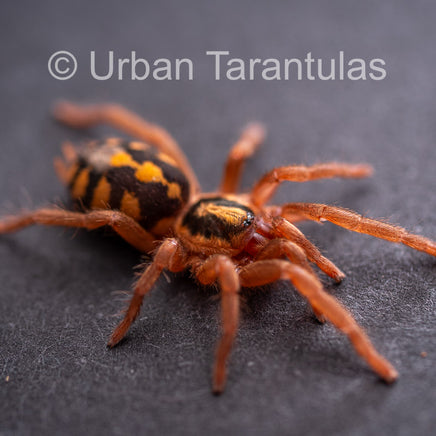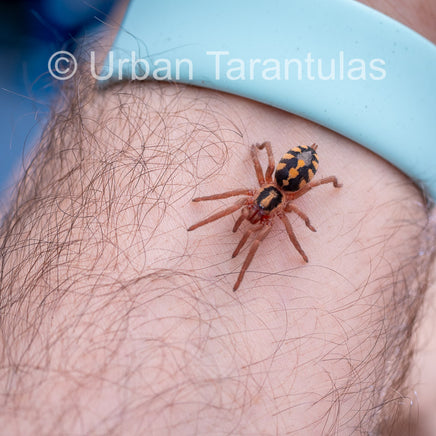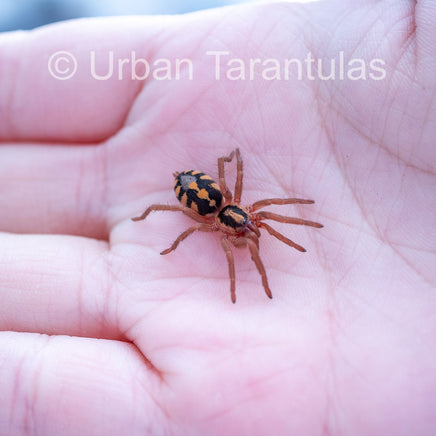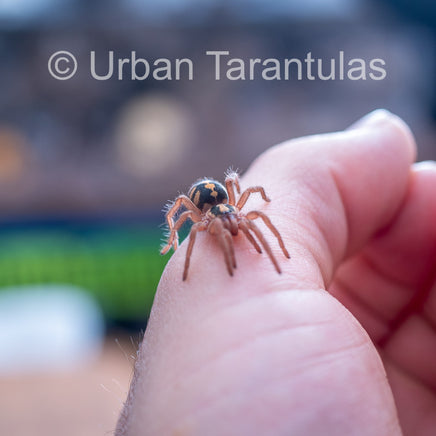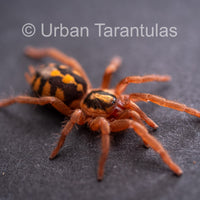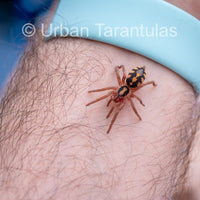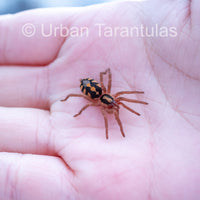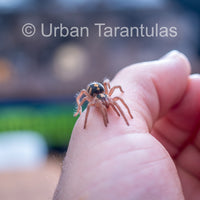🎃 Hapalopus formosus – The Pumpkin Patch Tarantula
Also called the Halloween Tarantula or Colombian Pumpkin Patch
Tiny spider, big attitude, and some of the coolest markings in the hobby. Hapalopus formosus is beautifully patterned with bold orange “pumpkin” spots across its abdomen, paired with black and caramel tones throughout the body. It’s fast, active, and a joy to watch—especially when it webs up and makes little tunnels. This is one of those tarantulas that turns even non-spider people into fans.
🕸️ Care Details:
- Temperature: 75°F to 85°F works well. Warmer setups = faster growth and more activity.
- Humidity: Keep it around 70%. I keep one side of the enclosure slightly moist and let the rest dry out. Good balance and ventilation are key.
-
Housing (Terrestrial species):
- Babies: A 1oz to 4oz deli cup with pinhole ventilation is perfect. Ask during checkout if you’d like one for free—if you don’t ask, I won’t include it.
- Juveniles: Enclosure 2 to 3 times their size with moist substrate and a cork bark hide. They love to web and tunnel.
- Adults: This species stays small, so even adult females can live comfortably in a 6x6 or 8x8 enclosure.
🪳 Feeding:
They eat like champs. I give them pinhead crickets or baby roaches when they’re small, then gradually scale up to large crickets as adults.
If prey is too big, crush the head and drop it in—they’ll scavenge like pros.
Occasional treats like small waxworms or soft-bodied feeders work well too.
Always remove uneaten food to avoid mold or mites.
🔍 In-Depth Facts:
- Latin name: Hapalopus formosus
- Common names: Pumpkin Patch Tarantula, Halloween Tarantula
- Locale: Colombia – tropical lowland regions
- Category: Terrestrial – stays low to the ground, webs heavily, and often creates little burrows
- Size: Females reach about 3–4 inches, males slightly smaller
- Urticating hairs: Yes—but rarely kicks. More likely to run than defend.
- Growth rate: Fast grower for its size—can mature in 1.5 to 2 years with proper feeding
- Life span: Females live 10 years; males 2–3 years
- Recommended levels: Great for everyone. Perfect starter tarantula, especially if you want something small, active, and colorful.
Stay Connected:
- Instagram – Feeding clips, new arrivals, and behind-the-scenes content
- YouTube – Educational care videos and tarantula profiles
- Facebook – Reviews and community feedback
- TikTok – Short clips and feeding time favorites
⚠️ Safety Disclaimer:
Experiencing a tarantula bite is an extremely rare occurrence, and it's important to note that there have been no recorded fatalities due to a tarantula bite. The venom potency varies across species, with Old World tarantulasgenerally having stronger venom than their New World counterparts. Within the Old World category, the Poecilotheriagenus is known for having particularly potent venom.
It's crucial to approach tarantulas with respect and understanding. If you happen to get bitten, which is unlikely, the key is to stay calm. In most cases, the discomfort is superficial and subsides within a few minutes to a few hours. However, bites from species with more potent venom may result in symptoms lasting up to a week. Remember, larger tarantulas tend to have more venom than smaller ones.
Please be aware that I cannot assume responsibility for bites. Tarantula handling should be done at your own risk. In my 11 years of experience with these creatures, I have only been bitten once, by a species with highly potent venom. While the experience was painful, the symptoms had completely disappeared after a week.
Handle tarantulas responsibly, and always prioritize your safety and the well-being of the tarantula.
